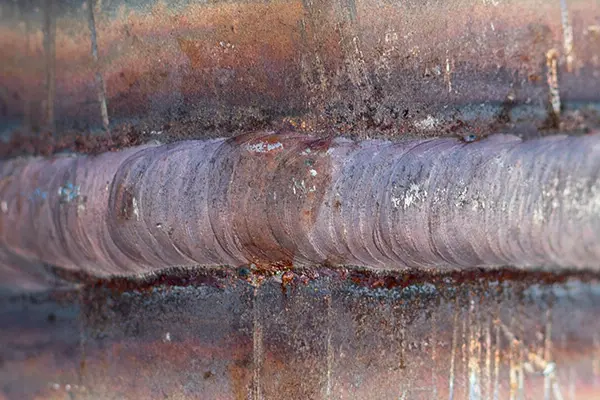
Welder qualification testing
DEKRA offers certification for welders, Initial certification and two-year extensions.

Welder qualification testing
DEKRA offers certification for welders, Initial certification and two-year extensions.
SS-EN ISO 9606-4 - Welder qualification testing
– Fusion welding of nickel and nickel alloys
This standard specifies the requirements for the qualification of welders performing fusion welding of nickel and nickel alloys.
Initial certification
During initial certification, the welding process is supervised by a welding inspector from DEKRA Industrial AB. The certificate is personal, valid for two years, and can be extended for another two years, provided that the welder continues to work within the certified scope, confirmed every six months by a responsible person at the employer.
1. Certification according to Welding Procedure Specification (WPS/pWPS)
- The certification process is conducted under supervision, where the welder follows a welding procedure specification developed according to SS-EN ISO 15609 (Specification and Qualification of Welding Procedures for Metallic Materials – Welding Procedure Specification).
- The welder must be knowledgeable and able to work according to the WPS.
- During the test, the welder is responsible for ensuring that all parameters (e.g., current, voltage, filler material) are adhered to. The supervisor ensures that the welder strictly follows the WPS.
- Upon completion of the test, the welder must clean the weld from oxides, spatter, etc.
2. Visual and non-destructive/mechanical testing
- Each test piece is visually inspected and tested using one or more testing methods in accordance with the standard, such as radiographic testing, ultrasonic testing, or bend testing.
- If all requirements are met, a welder qualification certificate (commonly referred to as a "welding license") is issued.
3. In cases where...
- In cases where most of the work involves fillet welds, the welder must also qualify with an appropriate fillet weld test. In cases where the work mainly involves butt welds, a butt weld qualification also qualifies for fillet welds.
4. Knowledge test (theoretical exam)
- Such an exam may be conducted but is not mandatory.
Two-year renewal
Since SS-EN ISO 9606-4 does not allow a three-year rule, the certificate is only valid for two years.
To extend the certificate for another two years, the following conditions must be met:
1. 6-month confirmation
A responsible person at the employer must, every six months, confirm that the welder continues to work within the qualified scope.
A responsible person at the employer must, every six months, confirm that the welder continues to work within the qualified scope.
2. Traceable documentation
All documentation and evidence used to support the extension must be traceable to the welder and clearly state which WPSs have been used in production.
All documentation and evidence used to support the extension must be traceable to the welder and clearly state which WPSs have been used in production.
3. Testing of a weld
In the past six months, a weld must have been tested – either by volumetric testing (e.g., radiographic or ultrasonic testing) or mechanical testing (e.g., fracture or bend testing).
In the past six months, a weld must have been tested – either by volumetric testing (e.g., radiographic or ultrasonic testing) or mechanical testing (e.g., fracture or bend testing).
4. Acceptance criteria
The tested weld must meet the acceptance limits for discontinuities and shape deviations specified in the standard (e.g., in the section on acceptance criteria).
The tested weld must meet the acceptance limits for discontinuities and shape deviations specified in the standard (e.g., in the section on acceptance criteria).
5. Recreation of original conditions
The test results must demonstrate that the welder has recreated the original conditions of the test.
The test results must demonstrate that the welder has recreated the original conditions of the test.
Pricing and agreements
Certification is conducted according to DEKRA’s price list or through agreements/quotations.
- Notified Body
DEKRA Industrial AB can also assess certification as a Notified Body according to AFS 2023:5 (PED/2014/68/EU) Annex 1, Section 3.1.2, which is relevant for pressure equipment. - Appeals
DEKRA Industrial’s decisions on certification matters can be appealed. Complaints must be submitted in writing to the management of the certification body.
Summary
- Initial certification: A practical welding test under supervision with WPS/pWPS, leading to a personal certificate valid for two years.
- 6-month confirmation: Regular confirmations from a responsible person at the employer ensure that the welder continues to work within the qualified scope.
- Two-year renewal: The extension is granted by demonstrating that the original conditions are recreated via a tested weld (volumetric or mechanical testing), with full traceable documentation and fulfilled acceptance criteria.
- Other: Pricing according to DEKRA’s price list/agreements and the possibility to assess certification as a Notified Body under applicable directives. Appeals are handled in writing.
With this setup, it is ensured that the welder’s qualification for fusion welding of nickel and nickel alloys (ISO 9606-4:1999) is conducted in a high-quality manner.